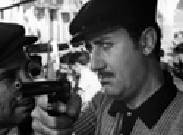|
|
||||
|
|
by Donald Levit  The oldest and least known of three classic retrospectives slated for the 44th New York Film Festival, Mafioso was released here in 1964 by a small moribund distributor and has remained unscreened since. “A grossly underappreciated directorial talent,” its Alberto Lattuada, too, has not been treated kindly; poet, story writer, cofounder of Italy’s film archive Cineteca Italiana and a mover in its late ‘40s neorealism, he is often a footnote as the feuding co-director/-writer on Fellini’s first film, Variety Lights/Luci del varietá, at the start of the next decade. Outrunning her translator while switching back and forth between languages after the press-industry showing, the star of that collaboration and Lattuada’s wife of sixty years, spry eighty-one-year-old Carla del Poggio, responded to applause, “I am very happy to be in The Italian’s hour-and-two-thirds feature was aptly prefaced by Italian-American writer-director Joseph Infantolino’s fifteen-minute début, digital video Jimmy Blue (2006). Loving his little daughter and surly wife (Rebecca Rahimi, Patricia Dunnock), Pablo Schreiber’s title character moonlights for a neighborhood loan shark (John Doman). His own small business nearly belly up and himself in debt, he is pressured into muscling repayment from go-go-bar dancer Gina (Callie Thorne), a high school flame of his. The woman cannot pay, and, wondering how she will be able to ply her trade bruised and beaten, this good-hearted punk faces the decision to accept her offered sex, instead, or to comply with or-else orders. Mafioso is at the same time darker on a larger scale while yet the overriding impression is of laughter rather than the final tears. An actor and occasional director who at thirteen imitated Oliver Hardy to win an MGM contest and, after music-hall and stage experience, became one of Italy’s favorite movie comics in the 1950s, Alberto Sordi is Antonio Badalamenti, a Sicilian who has risen to shop management in Milan’s important FIAT plant. Though the actor had already started to do some heavier rôles, here he is buffoonishly family oriented, the nice guy who returns mislaid pens but will talk your ears off with nonstop praises of his blonde northern Italian wife Marta (Brazil’s Norma Bengell) and two daughters (Cinzia Bruno and Katiusca Piretti, as Cinzia and Cataerina). During his island youth in Calamo village, everyone’s pal “Nino” had been an admired sharpshooter and errand boy for the town’s mob -- still common today in restive high-unemployment “revolutionary” areas -- but that was a forgotten lifetime ago, as the time-obsessed bourgeois trades bonus pay for vacation days. His accent slipping back into vernacular as the four ferry to Events play out against relentless unshaded black-and-white of steep narrow streets, humble dwellings or moldy palaces and sun-drenched countryside in a rain-starved land where advertised water rights complicate a property eyed for purchase by his father. Something lurks in the shadows, bringing this only-seemingly simple satire closer to Ealing’s slightly earlier sophistication than to the period’s bungled burglary comedies. Planning to re-release the film early next year, with a “Beciamo le mani, Grazie Mille,” Rialto Pictures requests that there be no spoilers. There are hints, nevertheless, in past and present favors received from local capo Don Vicenzo (Ugo Attanasio), in the bejeweled engraved heart which Nino’s New-Jersey-born-of-Calamo-parents boss in Milan (Armando Tine, as Dr. Zanchi) has him bring as a gift to hang on the church altar, in the faces that observe the fearsome omerta vow of silence but know something the puffed-up oblivious hero cannot see. Connected still by sharp bursts of humor, the final minutes are nightmare, literally a world away. That the dénouement appears so surreal, that With whatever proportions of fact and fancy, The Godfather saga fixed today’s picture of the Mafia. In The Godfather Part III, Del Poggio revealed, Coppola had wanted to cast Attanasio, “but dad was very ill.” Her father was eighty-three as his son-in-law’s film capo di capi, which would have made him well over a hundred when Zoetrope called. (Released by Rialto Pictures; not rated by MPAA.) |
||
|
© 2026 - ReelTalk Movie Reviews Website designed by Dot Pitch Studios, LLC |



